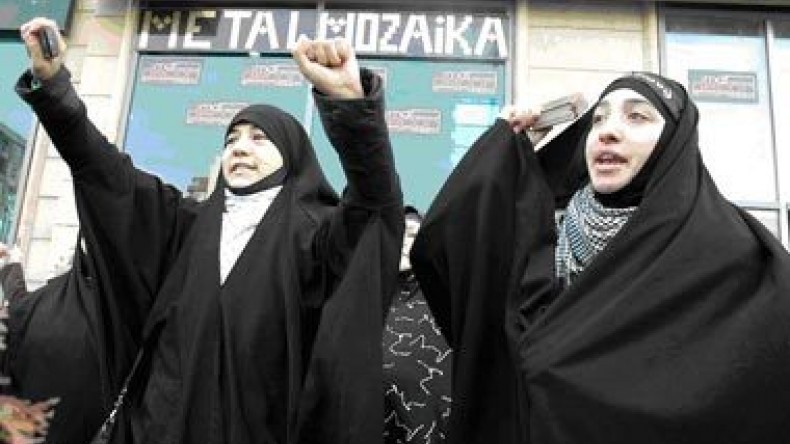
Azerbaijan secular country: What about society?
The constitution of the country declares Azerbaijan as secular state, where religion and state are separated, where everyone has equal rights to exercise his/her belief, no matter which religion a person is affiliated to. Azerbaijan has often been identified as one of the most secular Muslim countries, where state has managed to keep balance between religion and state.
Sounds great, isn’t it? Now let’s come out of the world of imagination and look directly into realty.
In spite of the fact that Azerbaijan officially is considered a secular state, religion plays a prominent part in social as well as political life of the country. Approximately 96-98% of Azerbaijani population is Muslim. The majority of Azerbaijani society is Shiites (65%), while almost 35% are Sunnis. The number of representatives of other religions doesn’t pass 6-7%. Islam has intensively started to revive in Azerbaijan after the country gained its independence; that is from late 20th century on. Simultaneously Islam was used on two fronts: the state was using Islam to consolidate the identity of people leaving in Azerbaijan, while different streams and branches of Islam under the supervision of some countries (mainly Iran, Turkey, Saudi Arabia) penetrated into the country and started to attract people and disseminate their ideology in the society. As a result, today, we have what we have! Islam is an inseparable part of Azerbaijani society, frequently cause of tensions, protests, even sometimes armed clashes, in spite of the fact that the state authorities restrict religion through official as well as unofficial means: such as legal amendments to law on religion and wave of arrests of religious activists on fabricated charges.
The analysis of Caucasus Barometer data, country-wide survey conducted in Azerbaijan starting from 2008-2009, once more confirms that in Azerbaijan the society is becoming more and more religious.
In a period of 2009 to 2013 the number of Azerbaijanis that considered religion to be important part of their everyday life increased from 67% to 82%. Over half of the population as of 2013 (58%) fast because it is required by religion. Azerbaijani society as well tends to trust religious organizations. In 2013, 65% of Azerbaijani society reported about their trust towards religious organizations. The self-reported religiosity of Azerbaijanis experienced a gradual increase. In 2011, 25% of the population considered themselves religious, while in 2013 this number already equaled to 32%, whereas the increase was constant.
The attendance to religious services as well has been rising in spite of Azerbaijani authorities’ crackdown on religious leaders, activists and closure of mosques. Though in 2009, as analysis show, the Azerbaijanis didn’t attend to religious services frequently: only half of the population went on services on special holidays, in 2013 20% of the population attended religious services at least once a month because it is required by religious traditions.
This is the overall image of the whole Azerbaijani population. However, the trend is not identical all over the territory of the country. There are regions in Azerbaijan that are considered to be traditionally religious ones. The main reason for that is historical. Those religious regions were Iran influenced Shia regions, Turkey influenced Sunni ones or North Caucasus and Saudi Arabia influenced Salafi ones. The most religious regions and cities of Azerbaijan are northern regions of Zakatali, Ismaili, Qakh, Geychai, Evlakh, Quba, Ganja, Qusar as well as southern regions of Jalilabad, Masala, Lenkoran and Absheron Peninsula: Baku, Sumgait, Nardaran. Those are hot spots of the country, the places where most frequently religious protests and clashes are taking place.
Overall, in spite of the fact that Muslim society of Azerbaijan belongs to different branches and streams of Islam and different regions of the country enjoy diverse degrees of religiosity, the overall picture is that the personal religiosity of Azerbaijani society has been gradually increasing from 2009 to 2013, given the mean of religions importance and self-perception of religiousness, reaching to the point where more than half of the population is religious. Though the reported attendance to religious services monthly don’t pass 20% yet, there is comparatively high trust towards religious organizations and more than half of the population on special holidays attend to services because it is required by religion, and more than a half from time to time follow religious traditions. All these developments occurred in the environment of restrictive legal and administrative measures aimed at preventing people to exercise their religious freedom, not even given the illegal restrictions towards religious associations and persons, who have constantly become subject of harassment of the authorities. Interestingly, there is an opinion in the academic community that Islamic revival in recent years, besides world events, has been directly influenced by those restrictions and harassment towards believers. The theory of counter-reaction? We will see…
Nelli Minasyan
Newsfeed
Videos






























